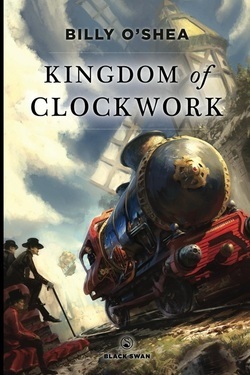Kingdom of Clockwork - Billy O'Shea
 You can be damned if you question the society you live in.
You can be damned if you question the society you live in.This was the message I walked away with after reading Kingdom of Clockwork. As I read this book, I felt as if I were reading a philosophical debate - which isn't a bad thing. I love stories that make me think. I love characters who question their worlds. Their surroundings.
And despite his upbringing, Karl Neilsen did just that.
O'Shea's strength lies in his ability to use metaphors. The clocks in his story represented society to me. That society holds onto a strange power, which can be used to further your cause - or crush you. I loved the metaphors. I loved the philosophical questions he raised. But most of all?
I loved the language.
Writing is an art best judged by the reader. I strongly believe that. But it is the writer's job to ensure that reader gets the ultimate experience from their story. O'Shea did this for me. The elements of steampunk, the fascination with how cogs and gears worked - all of it tied into the underlying story of how a young man begins to question everything he had been taught as well as the fragile society he lived in.
For me, this is a strong read. It invokes thought. Questions. I would stop reading just to consider the concepts O'Shea was bringing to mind, then jump back into the story to see what the characters thought about the same theories. Was I right? Could there be a right answer?
Overall, this is a great steampunk novel and it is deep. Really deep. Pick it up, but don't fly through it. Think about the questions raised by this intellectual read.
And enjoy every minute of it.
Where to Find Kingdom of Clockwork

 About the Author At the age of 23, Billy O'Shea left Ireland to live the vagabond life, and after many adventures he arrived penniless and homeless on the streets of Copenhagen one icy winter day in the early eighties. Of the city, he says "It was unrequited love at first sight". Eventually he found work as a bar musician, and began to study at the University of Copenhagen, where after graduating he won the University's gold medal for a paper on translation and culture, and accepted the congratulations of Queen Margrethe. Since then he has mainly worked as a translator. He still lives in Copenhagen with his wife and three children.
About the Author At the age of 23, Billy O'Shea left Ireland to live the vagabond life, and after many adventures he arrived penniless and homeless on the streets of Copenhagen one icy winter day in the early eighties. Of the city, he says "It was unrequited love at first sight". Eventually he found work as a bar musician, and began to study at the University of Copenhagen, where after graduating he won the University's gold medal for a paper on translation and culture, and accepted the congratulations of Queen Margrethe. Since then he has mainly worked as a translator. He still lives in Copenhagen with his wife and three children. Of his writing, he says: "I have tried to create an imaginary world, a kind of parallel Scandinavia with a Renaissance-like culture, which relies on clockwork as its primary technology. The Renaissance was a very colourful and dramatic period in Scandinavian history - the time of King Christian IV and Tycho Brahe, of the Nordic Wars and the Stockholm Bloodbath. It is great fun to take some aspects of this world and play with it by adding airships, bicycles and clockwork computers - as well as some Byzantine court politics. It is a fun world to live in, in the imagination. And that, I suppose, is the ultimate ambition of any writer: to give the reader a world to live in."
Published on December 18, 2014 23:30
No comments have been added yet.



